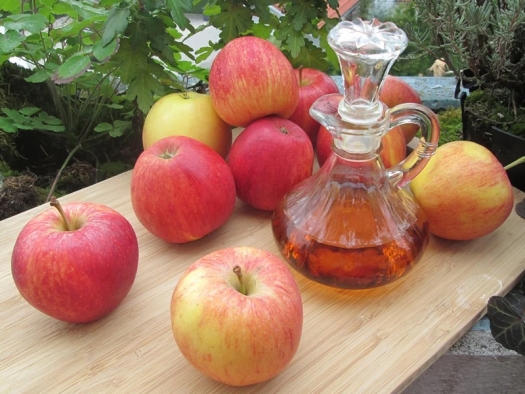ApplesAndVinegar.jpg

Photo by wicherek / Pixabay.com
In the mid-1950s D. C. Jarvis M.D. published “Folk Medicine,” a book which sold over a million copies. Even though he was an M.D. graduate of the University of Vermont Medical College, he learned about the effectiveness of many aspects of Vermont folk medicine while practicing there.
One of his principal topics was the use of vinegar for a wide range of health problems. Although the “mainstream medicine” of his time was mostly critical of his observations, research published since then has confirmed what he wrote. What follows are summaries of some of those research publications, as well as summaries of other “vinegar research.”
Vinegar reduces obesity
One of Dr. Jarvis’ principal observations was that daily intake of vinegar promoted weight loss. In 2009, a Japanese research group published research observations about acetic acid (the “active ingredient” in vinegar) and weight loss in mice, and vinegar itself in humans. The title of the mouse research report1 tells us what was observed: “Acetic acid upregulates the expression of genes for fatty acid oxidation enzymes in liver to suppress body fat accumulation.” More simply: Acetic acid makes our livers burn more fat so less is stored, which leads to weight loss.
As noted, the same research group also published about vinegar consumption and weight loss in humans.2 Over a twelve week period, three groups of overweight individuals (58 or 59 individuals in each group) ate the same amounts of protein, fat and carbohydrate, and drank twice daily approximately nine ounces of a same-tasting drink containing no vinegar, or approximately one-half ounce, or approximately one ounce of vinegar.
Compared with the placebo group, total body weight, body mass index, and body fat ratio were significantly lower in both groups consuming the vinegar at weeks 4, 8, and 12 of the research trial. In addition, the low dose vinegar group had significantly lower serum triglycerides than the placebo group at weeks 4, 8, and 12 of the research trial, and lower total cholesterol levels at week 12. The high-dose vinegar group had lower serum triglycerides than the placebo group at weeks 4 and 12, and also significantly lower systolic blood pressure by week 12.
In 2014, another research group reported3 the effects of pomegranate vinegar (which contains acetic acid and smaller amounts of ellagic acid) versus placebo on body fat. In this research, seventy-eight overweight women were randomly assigned to receive either pomegranate vinegar (200 milliliters or approximately 6½ ounces daily) or a placebo for eight weeks. The pomegranate vinegar significantly reduced visceral adipose tissue in the vinegar-consuming group.
These researchers also reported another “mechanism of action” (“how does it work”) which is different-and potentially more important-than the “mechanism of action” (more fat burning by the liver) reported by the mouse researchers noted in the first research report summarized above. We’ll get to this potentially more important mechanism of action at the end of this article.
Vinegar decreases fasting blood sugar and insulin response
In this research4, volunteers ate a “breakfast” of refined-flour wheat bread (no, not a very health-promoting breakfast) containing 50 grams of refined carbohydrate (approximately one and two-thirds ounces) and drank low, medium and high amounts of vinegar. The researchers reported that all three levels of vinegar resulted in levels of blood sugar and insulin significantly lower than those reached when vinegar wasn’t used with the same “breakfast.” The higher level of vinegar achieved the best (the lowest) increase in blood sugar and insulin. There was also an decrease in remaining degree of hunger after that “breakfast” with the larger amount of vinegar.
Vinegar for a healthier, longer life?
So what’s this about a more important “mechanism of action” for vinegar found by this report? The researchers reported that this additional “mechanism” is “AMPK activation,” activation of “adenosine monophosphate kinase,” an enzyme that’s been linked-when activated-to greater and more healthy longevity!
Here’s the title of a publication5 reviewing AMPK activation: “AMPK activation – protean potential for boosting healthspan.” The author tells us that “AMPK activation is suspected to mediate some of the health-protective effects of long-term calorie restriction” and that “current evidence indicates that AMPK activators may reduce risk for atherosclerosis, heart attack, and stroke; help to prevent ventricular hypertrophy and manage congestive failure; ameliorate metabolic syndrome, reduce risk for type 2 diabetes, and aid glycemic control in diabetics; reduce risk for weight gain; decrease risk for a number of common cancers while improving prognosis in cancer therapy; decrease risk for dementia and possibly other neurodegenerative disorders; help to preserve the proper structure of bone and cartilage; and possibly aid in the prevention and control of autoimmunity.”
Another review of AMPK function6 is titled: “AMP-activated protein kinase (AMPK) controls the aging process via an integrated signaling network.” In the abstract, the authors write: “Many studies with lower organisms have revealed that increased AMPK activity can extend the lifespan.” Since humans usually have much longer lifespans than “lower organisms,” absolute certainty isn’t possible about human AMPK activation extending not only human lifespan but (as quoted above) improving human health at the same time (the combination being termed the “healthspan”). However, this possibility appears very likely!
Vermont folk medicine and D. C. were “right on”!
“Modern science” is confirming what Vermont “Folk Medicine” knew in the mid-1950s and very likely before: vinegar is good for our health! Vinegar reduces obesity, improves blood sugar and insulin response (lower numbers for both) to carbohydrate, and most importantly, vinegar very likely increases longevity and improves health at the same time!
“Mainstream medicine” still doesn’t understand that our ancestors in health care were very likely just as smart (and in some cases, just as dumb) as we are today. If a treatment has been used successfully for centuries (for example, traditional Chinese medicine), it’s very likely it works, or it would have been discarded at least a few of those centuries ago. Folk medicine treatments with a long history of successful use should never require “approval” (at a cost of billions of dollars) by King George III or anyone else before they can be advertised and used. Elimination of this “approval” for advertising and use of centuries-old successful treatments would not only help us with our health problems, but lower the cost of health care very significantly!
Back to vinegar: it’s definitely a safe, effective tool for promotion of better health and very likely a longer, healthier life. If you’re not using vinegar regularly already as many of us are, please consider starting to use it for yourself!
For the very few who don’t know, there are multiple sources and flavors of vinegar: apple cider vinegar, rice vinegar, wine vinegar, pomegranate vinegar-the list goes on and on. Find one that you personally like, and for better health, use it regularly!
References
- Kondo T, Kishi M, et al. “Acetic acid upregulates the expression of genes for fatty acid oxidation enzymes in liver to suppress body fat accumulation.” J Agric Food Chem. 2009 Jul 8;57(13):5982-6.
- Kondo T, Kishi M, et al. “Vinegar Intake Reduces Body Weight, Body Fat Mass, and Serum Triglycerides in Obese Japanese Subjects.” Biosci Biotechnol Biochem. 2009;73(8):1837-1843.
- Park K, Kim J et al. “Pomegranate vinegar beverage reduces visceral fat accumulation in association with AMPK activation in overweight women: A double-blind, randomized, and placebo-controlled trial.” Journal of Functional Foods. 2014;8:274-281.
- Ostman E, Granfeldt Y et al. “Vinegar supplementation lowers glucose and insulin responses and increases satiety after a bread meal in healthy subjects.” Eur J ClinNutr. 2005 Sep;59(9):983-8.
- McCarty MF. “AMPK activation-protean potential for boosting healthspan.” Age (Dordr). 2014 Apr;36(2):641-63.
- Antero Salminena A, Kaarnirantac K. “AMP-activated protein kinase (AMPK) controls the aging process via an integrated signaling network.” Ageing Research Reviews. 11 (2012) 230- 241.
Vinegar For Better Health was originally published in Green Medicine Newsletter, March 19, 2019. Used with permission.


